Art print | Interior of Marseille prison: a scene from Little Dorrit - William Powell Frith


View from behind

Frame (optional)
Interior Art print of the Marseille prison: a scene from La Petite Dorrit - William Powell Frith – Captivating introduction
The artwork "Interior of the Marseille prison: a scene from La Petite Dorrit" by William Powell Frith offers a true window into Victorian England, providing an immersive glimpse into the society of its time. This scene, inspired by Charles Dickens' novel, depicts a poignant moment in the lives of the characters, illustrating both sadness and hope. Frith, as a true visual storyteller, manages to capture human emotions with remarkable finesse. Through this art print, viewers are invited to discover the nuances of the human soul while witnessing a bygone era.
Style and uniqueness of the work
Frith's style is characterized by striking realism, which is evident in every detail of his composition. The artist excels in depicting facial expressions and postures of the characters, making each figure almost alive. In "Interior of the Marseille prison," the interplay of light and shadow creates an atmosphere that is both dark and captivating, heightening the dramatic tension of the scene. The colors, though often muted, are carefully chosen to reflect the prison environment, while highlighting the emotions of the characters. The richness of details, from clothing to the textures of the prison walls, demonstrates meticulous attention that sets this work apart in the 19th-century artistic landscape.
The artist and his influence
William Powell Frith, born in 1819, is one of the most emblematic painters of his time. His ability to capture scenes of everyday life with such psychological depth made him a pioneer of realism in painting. Frith was influenced by the works of his contemporaries, but he developed a unique style that combines storytelling and social observation. His commitment to representing the human condition, often through narratives inspired by literature, marked a generation of artists and continues to inspire contemporary artists. "Interior of the Marseille prison" is a perfect example of his skill in transforming a simple scene into a painting loaded with meaning, where each element tells a story.
An exceptional wall decoration signed Artem Legrand
Integrate

Matte finish

View from behind

Frame (optional)
Interior Art print of the Marseille prison: a scene from La Petite Dorrit - William Powell Frith – Captivating introduction
The artwork "Interior of the Marseille prison: a scene from La Petite Dorrit" by William Powell Frith offers a true window into Victorian England, providing an immersive glimpse into the society of its time. This scene, inspired by Charles Dickens' novel, depicts a poignant moment in the lives of the characters, illustrating both sadness and hope. Frith, as a true visual storyteller, manages to capture human emotions with remarkable finesse. Through this art print, viewers are invited to discover the nuances of the human soul while witnessing a bygone era.
Style and uniqueness of the work
Frith's style is characterized by striking realism, which is evident in every detail of his composition. The artist excels in depicting facial expressions and postures of the characters, making each figure almost alive. In "Interior of the Marseille prison," the interplay of light and shadow creates an atmosphere that is both dark and captivating, heightening the dramatic tension of the scene. The colors, though often muted, are carefully chosen to reflect the prison environment, while highlighting the emotions of the characters. The richness of details, from clothing to the textures of the prison walls, demonstrates meticulous attention that sets this work apart in the 19th-century artistic landscape.
The artist and his influence
William Powell Frith, born in 1819, is one of the most emblematic painters of his time. His ability to capture scenes of everyday life with such psychological depth made him a pioneer of realism in painting. Frith was influenced by the works of his contemporaries, but he developed a unique style that combines storytelling and social observation. His commitment to representing the human condition, often through narratives inspired by literature, marked a generation of artists and continues to inspire contemporary artists. "Interior of the Marseille prison" is a perfect example of his skill in transforming a simple scene into a painting loaded with meaning, where each element tells a story.
An exceptional wall decoration signed Artem Legrand
Integrate






